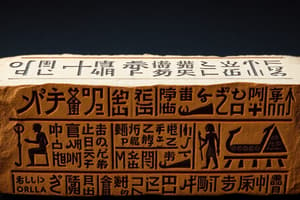Podcast
Questions and Answers
What were the primary purposes of the Rosetta Stone when it was created?
What were the primary purposes of the Rosetta Stone when it was created?
It served to announce the leadership of Pharaoh Ptolemy I and establish generous tax breaks for priests.
What breakthrough did Thomas Young achieve in understanding the Rosetta Stone?
What breakthrough did Thomas Young achieve in understanding the Rosetta Stone?
He identified a group of symbols that spelled the name 'Ptolemy'.
Who ultimately succeeded in fully deciphering the hieroglyphics on the Rosetta Stone, and in what year?
Who ultimately succeeded in fully deciphering the hieroglyphics on the Rosetta Stone, and in what year?
Jean-François Champollion succeeded in deciphering the hieroglyphics in 1882.
What is Rongorongo, and why is it significant in the study of written languages?
What is Rongorongo, and why is it significant in the study of written languages?
How did the British Army come to possess the Rosetta Stone?
How did the British Army come to possess the Rosetta Stone?
What is the estimated age of the Voynich Manuscript?
What is the estimated age of the Voynich Manuscript?
What are researchers unsure about regarding the Voynich Manuscript?
What are researchers unsure about regarding the Voynich Manuscript?
What significant archaeological find was made in Romania in 1961?
What significant archaeological find was made in Romania in 1961?
Why have the Tartaria Tablets sparked diverse opinions among experts?
Why have the Tartaria Tablets sparked diverse opinions among experts?
What themes have emerged in contemporary culture due to the Voynich Manuscript?
What themes have emerged in contemporary culture due to the Voynich Manuscript?
Flashcards are hidden until you start studying
Study Notes
The Rosetta Stone
- Located in the British Museum, the Rosetta Stone appears to be a mundane piece of rock but plays a pivotal role in the understanding of ancient history.
- The stone is actually a tax document, commemorating the rule of Pharaoh Ptolemy V, written in three languages: Greek, Demotic, and hieroglyphics.
- Created in 196 BCE, the Rosetta Stone was one of 18 stones installed in temples across Egypt to announce the pharaoh's significance and enact tax benefits for priests.
- After 2000 years in Egypt, the stone was captured by the British Army in 1801 and brought to London for academic study.
- Early attempts to decipher hieroglyphics were unsuccessful until Thomas Young identified symbols spelling "Ptolemy," later advanced by Jean-François Champollion, who decoded the text in 1822.
Mysteries of Unsolved Languages
- Several manuscripts remain undeciphered despite extensive research, including:
- Rongorongo: A potential written language found on wooden artifacts from Easter Island in the 19th century, consisting of symbols representing animals, humans, and plants. Its interpretation remains elusive, with theories linking it to lunar cycles or suggesting it may have been a memory aid or decorative art.
- Voynich Manuscript: Dated to the early 15th century, this book features an unknown language and bizarre illustrations of flora and fauna. Its contents have sparked debates about its authenticity, potential as a medieval medicinal guide, or even a hoax.
- Tartaria Tablets: Discovered in Romania in 1961, these discs are estimated to be over 7000 years old, possibly representing the earliest known form of writing. Their symbols and meanings remain a subject of contention among experts.
Ongoing Exploration of Ancient Messages
- Despite breakthroughs like those achieved with the Rosetta Stone, many historical scripts and symbols remain undeciphered, inspiring ongoing research and speculation.
- The enigmatic nature of these artifacts continues to spark interest in archaeology, linguistics, and cultural history, prompting future discoveries and interpretations.
Studying That Suits You
Use AI to generate personalized quizzes and flashcards to suit your learning preferences.




